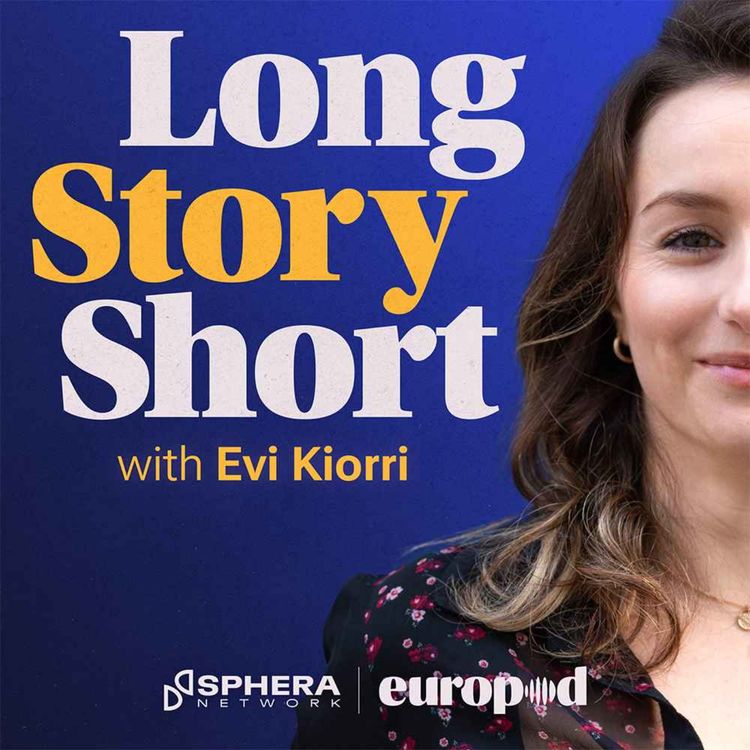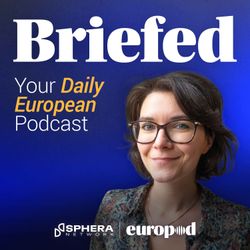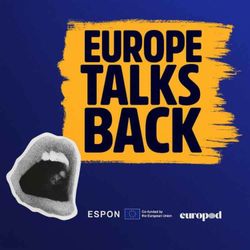Share

Europod • News
Europe’s toxic crisis: Plastics industry lobbying to shield 'forever chemicals’
Season 1, Ep. 7
•
Forever chemicals, the toxic, indestructible substances hiding in our everyday lives are threatening Europe’s environment and public health. From their staggering cleanup costs to the plastics industry’s relentless lobbying to block a ban, this episode unpacks the high stakes of PFAS pollution. Why should Europeans care? Because these chemicals don’t just stay in factories, they seep into our water, soil, and bodies. Tune in to explore what’s being done, what’s standing in the way, and why it’s crucial to act now.
Join us on our journey through the events that shape the European continent and the European Union.
Production: By Europod, in co production with Sphera Network.
Follow us on:
More episodes
View all episodes

28. Is the EU still the biggest supporter of international law?
04:58||Season 2, Ep. 28Historically, the EU has placed crucial importance on upholding international law. But after the US and Israeli strikes in Iran, the EU is turning a blind eye to the violation of the principles of the UN Charter. Are we witnessing an erosion of this principle within the EU?Production: By Europod, in co-production with the Sphera network.Follow us on:LinkedInInstagram
28. Today on Briefed: Europe Talks Back (Extended Format)
24:14||Season 2, Ep. 28Today’s Briefed Special is a longer conversation from our series Europe Talks Back.The European Union is one of the world’s most developed regions; yet deep territorial inequalities persist. According to Eurostat, GDP per capita can vary threefold within the same member state, with capital regions often earning twice as much as the rest of the country.In this episode of Europe Talks Back, produced with ESPON, Léa Marchal explores why many small and medium-sized cities are losing ground — and whether this trend can be reversed.Joined by Andrés Rodríguez-Pose, Professor at the London School of Economics and Chair of the High-Level Group on the Future of EU Cohesion Policy, the discussion looks at demographic decline, policy blind spots, and the limits of current cohesion funding.Are these cities doomed to fall behind - or can smarter investment and stronger local institutions help them thrive again?Join us on our journey through the events that shape the European continent and the European Union.A podcast by Europod, in cooperation with ESPON, an EU-funded programme that bridges research with policies“This podcast series is cofunded by ESPON. However, the opinions and views expressed are solely those of the authors. ESPON can't be held responsible for them.”
Will the death of activist Quentin Deranque weaken antifascist movements in Europe?
05:19|“Far-left kills.” That’s how extreme-right protesters have described the death of Quentin Deranque. A formula also used by various political figures in France and abroad to blame far-left and antifascist movements in a broader sense.Can this dramatic event weaken antifascist movements across Europe?Production : By Europod in co-production with the Sphera network.This episode is based on a story written by Enric Bonet for El Salto and another one written by László Szily for 444, and is co-written with Hélène Pillon from Médianes.
26. The fabricated controversy around Spain’s Therian subculture
04:21||Season 2, Ep. 26In Spain, the Therian community—people who spiritually identify as animals—has been the subject of heated debates on social media and in the press. Yet, the phenomenon exists primarily in the mouths of its detractors. Why has such a minority movement received so much attention in recent days?Production: By Europod, in co-production with the Sphera network.Follow us on:LinkedIn • Instagram
25. How Poland is preparing for a potential war?
04:40||Season 2, Ep. 25Poland isn’t just preparing for war—it’s rewriting the rulebook on how to get ready. The defence training programmes adopted in 2025 should train some 400 000 people this year only. Meanwhile, the rest of the EU is slowly catching up on defence. What can we learn from Poland’s approach?Production: By Europod, in co-production with the Sphera network.Follow us on:LinkedInInstagram
24. How does the EU respond to US sanctions against Europeans?
05:05||Season 2, Ep. 24The U.S. President keeps putting pressure on the EUWhether it’s sanctions against International Criminal Court judges or threats of tariffs, Donald Trump is using coercion to sway European decisions.So what is the EU doing to protect its independence from American pressure?Production: By Europod, in co-production with the Sphera network.Follow us on:LinkedInInstagram
23. Are we serious about regulating AI ?
05:40||Season 2, Ep. 23AI can be tricked into saying almost anything. That’s what a BBC journalist recently discovered. He found an easy way to make AI say whatever he wanted.Are authorities doing enough to regulate AI? At the EU level, is the AI Act doing its job?Production: By Europod, in co-production with the Sphera network.Follow us on: LinkedIn Instagram
22. Should the EU stay away from Trump’s board of peace?
05:05||Season 2, Ep. 22In Brussels, several EU member states are angry with the European Commission. These countries did not appreciate that the EU’s executive body attended the first meeting of the “Board of Peace” launched by Donald Trump.What was the alternative for the EU? Should Europeans stay away from this initiative?Production: By Europod, in co-production with the Sphera network.Follow us on: LinkedIn Instagram
21. Has the EU given up on participating in the peace negotiations between Ukraine and Russia?
05:32||Season 2, Ep. 21A new negotiation session ended yesterday between Ukraine and Russia, under the leadership of the United States. The EU, once again, did not take part in the peace talks, despite having long asked to do so. Has the EU given up on participating in the peace negotiations between Ukraine and Russia?Production: By Europod, in co-production with the Sphera network.Follow us on: LinkedIn Instagram